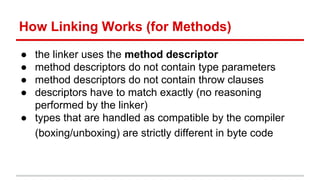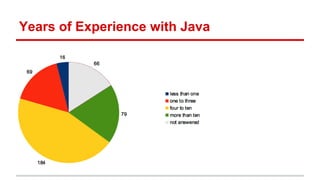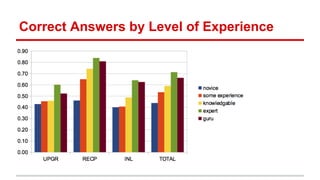What java developers (don’t) know about api compatibility
- 1. What Java Developers (don’t) know about API compatibility, and why this matters Jens Dietrich, May 2014 http://tinyurl.com/brokenapi
- 2. About the Author ● background (PhD): non-classical logic, very formal ● 1996-2003: no research, work in industry and development aid ● 2003-2012: ○ models, algorithms and tools to understand and improve the design and architecture of systems xplrarc.massey.ac.nz ○ exploring better ways to safely assemble systems from modules
- 3. Current Research Topics ● fast algorithms and effective data structures for the computation of transitive closure and CFL-reachability in sparse graphs (contract research for Oracle Labs) ● understanding circular dependencies between modules ● statistical oracles for performance regression testing ● API / component compatibility and evolution
- 4. Motivation ● relevant to industry ● under-researched topic ● trend towards more empirical studies in SE ● combination of software evolution and composition
- 5. Overview ● background ● puzzlers ● survey ● impact analysis and repository studies ● roadmap
- 6. Background ● applications are neither monolithic nor static ● they are composed using APIs provided by libraries, both libraries and the applications themselves change ● when is the evolution of libraries safe? ● this depends on: ○ the compatibility of changes made ○ how applications are built and deployed ● consider the Java platform (language and JVM), but findings can be generalised
- 7. Building and Deploying Java Applications 1. build (compile and test) programs with all libraries, deploy together mainstream, good tools support (Ant, Maven, Jenkins, ..) 2. build and upgrade libs only facilitates 24/7 applications, approach used in OSGi, app servers, JNLP
- 8. Types of Compatibility Program P uses API in library L L1 L2 P provider API contract consumer horizontal compatibility (h-comp(L, P)): L is compatible with P vertical compatibility (v-comp(L1,L2)): is L1 is h-compatible with P and L1 is v-compatible with L2, then L2 is h- compatible with P for all P
- 9. Compatibility in Java P is source compatible with L if P can be compiled with L P is binary compatible with L if P can be linked with L vertical only: L1 is behavioural compatible with L2 if the observable behaviour of P linked with either L1 or L2 is the same (contextual w.r.t. all or some P)
- 10. Binary Compatibility (v-Version) A change to a type is binary compatible with pre-existing binaries if pre-existing binaries that previously linked without error will continue to link without error. [JLS 7, sect 13.1]
- 11. Evolution Problem Given a program P and two versions of a library L: 1. if P is source/binary compatible with L-v1, is it still source/binary compatible with L-v2 ? 2. Is L-v1 behavioural compatible with L-v2?
- 12. Evolution Problems as Deployment Puzzlers ● inspired by Bloch/Gafter’s famous book ● 18 problems (May 2014) ● slides: http://www.slideshare.net/JensDietrich/presentation-30367644 ● code: https://bitbucket.org/jensdietrich/java-library-evolution-puzzlers ● discovery of bug in JLS-7
- 13. Structure of a Puzzler ● provide a program P consisting of an executable class <somepackage>.Main ● Main uses a class lib.<somepackage>.Foo defined in a library lib-1.0.jar ● there is a modified class lib.<somepackage>.Foo defined in a library lib-2.0.jar
- 14. Structure of a Puzzler (ctd) ● experiments: ○ compile P with lib-1.0.jar and then run it with lib-1.0.jar ○ compile P with lib-1.0.jar and then run it with lib-2.0.jar ○ compile P with lib-2.0.jar and then run it with lib-2.0.jar ● automated with build script
- 15. Source Compatibility !=> Binary Compatibility public class Foo { public static java.util.Collection getColl() { return new java.util.ArrayList(); } } public class Foo { public static java.util.List getColl() { return new java.util.ArrayList(); } } public class Main { public static void main(String[] args) { java.util.Collection coll = Foo.getColl(); System.out.println(coll); } } libversion1.0libversion2.0 client program using lib specialising return type (strengthen postcondition!)
- 16. Binary Compatibility !=> Source Compatibility public class Foo { public static List<String> getList() { List<String> list = new ArrayList<String>(); list.add(”42”); return list; }} public class Foo { public static List<Integer> getList() { List<Integer> list = new ArrayList<Integer>(); list.add(42); return list; }} public class Main { public static void main(String[] args) { List<String> list = Foo.getList(); System.out.println(list.size()); } } libversion1.0libversion2.0 client program using lib
- 17. Binary Compatibility !=> Behavioural Comp. public class Foo { public static List<String> getList() { List<String> list = new ArrayList<String>(); list.add(”42”); return list; }} public class Foo { public static List<Integer> getList() { List<Integer> list = new ArrayList<Integer>(); list.add(42); return list; }} public class Main { public static void main(String[] args) { List<String> list = Foo.getList(); for (String s:list) { System.out.println(s); } } } libversion1.0libversion2.0 client program using lib
- 18. How Bizarre ... import java.io.Serializable; class Foo<T extends Serializable & Comparable> { public void foo(T t) { t.compareTo(””); System.out.println(t); } } import java.io.Serializable; class Foo<T extends Comparable & Serializable> { public void foo(T t) { t.compareTo(””); System.out.println(t); } } public class Main implements java.io.Serializable { public static void main(String[] args) { Main m = new Main(); new Foo().foo(m); } } libversion1.0libversion2.0 client program using lib
- 19. Constant Inlining public class Foo { public static final int MAGIC = 42; } public class Foo { public static final int MAGIC = 43; } public class Main { public static void main(String[] args) { System.out.println(Foo.MAGIC); } } libversion1.0libversion2.0 client program using lib
- 20. How Linking Works (for Methods) ● the linker uses the method descriptor ● method descriptors do not contain type parameters ● method descriptors do not contain throw clauses ● descriptors have to match exactly (no reasoning performed by the linker) ● types that are handled as compatible by the compiler (boxing/unboxing) are strictly different in byte code
- 21. Why ? ● ensuring binary backwards compatibility is a major objective for JDK evolution ● bytecode kept stable, JVM innovation focuses on maintainability, stability and scalability ● language evolution focuses on programmer productivity
- 22. Why ? © cew118
- 23. How Java Evolves ● language innovation by adding syntactic sugar ● ensure byte code compatibility, perhaps add features (invokedynamic), but don’t modify existing ones ● compiler magic: ○ generic types => erasure ○ inner classes => synthetic methods to bypass encapsulation ○ covariant return types => return type overloading ○ reference vs value types => auto-(un)-boxing
- 24. How do Developers Cope ? from https://www.youtube.com/watch?v=M7FIvfx5J10 , Standard YouTube Licence
- 25. Study Repositories 1. Study program evolution in the qualitas corpus data set, find incompatible upgrades, and the impact this has on other programs. 2. Study Maven dependencies whether incompatibilities are introduced by recursive dependency resolution. Dietrich J., Jezek K., Brada P.: Broken Promises - An Empirical Study into Evolution Problems in Java Programs Caused by Library Upgrades. CSMR-WCRE'14. Jezek K., Dietrich J.: On the Use of Static Analysis to Safeguard Recursive Dependency Resolution. Accepted for SEAA 2014.
- 26. CSMR’14 Study ● studied 111 programs, 661 versions (Qualitas Corpus) ● incompatible API upgrades are common in real-world libraries: 344/455 (75%) of upgrades in data set have incompatibilities ● commodity libraries (antlr, ant, hibernate, weka, colt, junit, jung) are affected ● many constants that are inlined are then changed ● a lot of potential, but only a few actual problems
- 27. SEEA’14 Study ● study on transitive dependencies of 1902 Maven modules in Qualitas Corpus ● 367 modules depend on multiple versions of other modules ● common issues include: ○ incompatibilities between multiple versions ○ redundant (unused) dependencies ○ missing dependencies
- 28. What do Developers Know ? ● developers we asked were puzzled about our puzzlers ● idea: turn this into a survey ! ● problem: how to convince people to participate?
- 29. How not to do it © Tan Yuen http://www.gaolat.com/2013/10/vivo-pizza-free-pizzas-for-students.html
- 30. Challenges ● we are asking developers for a lot of time (>1H) ● i.e., we are asking them for a lot of money ● but we can offer them some value ● they will learn something !
- 31. Recruiting Participants ● JavaWorld ● Melbourne JUH ● several Czech JUGs ● NZ Industry Partners (Orion, SolNet, Kiwiplan) ● ex-students ● old boys networks: Stuttgart Java User Group, German Telecom
- 32. Acknowledgements Kamil Jezek (Uni Western Bohemia), Jeff Friesen, Athen O’ Shea (Java World), Kon Soulianidis (Melbourne JUG), Gareth Cronin (Orion), Manfred Duchrow (MD Consulting), Jochen Hiller (German Telecom), ...
- 33. Survey Design ● hosted on SurveyMonkey ● 7 background questions (experience) ● full survey: 21 standard puzzlers with 2 questions each, and 4 constant inlining puzzlers with 1 question per puzzler - a total of 46 technical questions ● short survey: 9 standard and 4 constant inlining puzzlers, a total of 22 technical questions
- 34. Standard Puzzler Q1 Q1 Can the version of the client program compiled with lib- 1.0.jar be executed with lib-2.0.jar ? a) no, an error occurs b) yes, but the behaviour of the program is different from the program version compiled and executed with lib-1.0.jar c) yes, and the behaviour of the program is the same as the program version compiled and executed with lib-1.0.jar
- 35. Standard Puzzler Q2 Q2 Can the client program be compiled and then executed with lib-2.0.jar ? a) no, compilation fails b) yes, but the behaviour of the program is different from the program version compiled and executed with lib-1.0.jar c) yes, and the behaviour of the program is the same as the program version compiled and executed with lib-1.0.jar
- 36. Defining Behaviour Change ● avoid references to JLS (most developers won't understand this) ● “a behaviour change is either a different console output or a situation where the execution of one program version throws an exception, but the other program version does not”
- 37. Inlining Puzzler Only one question is asked: Whether 42 or 43 is printed to the console when the program compiled with version 1.0 of the library is executed with version 2.0 of this library. I.e., whether a constant is inlined or not.
- 38. Conducting the Survey ● open between 15 November and 31 December 2013 ● 184 respondents started the short version ● 241 respondents started the full version ● we asked respondent doing the full survey whether they had already completed the short survey - 11 answered yes ● 414 unique respondents ● between 49 and 295 valid responses for technical questions
- 39. Level of Experience with Java
- 40. Years of Experience with Java
- 41. Occupation
- 42. Results: Standard Puzzlers, Q1 peaks: questions in short and full survey
- 43. Results: Standard Puzzlers, Q1 ● 51% of answers were correct ● only 27% correct for simple example like specialising return type !! ● only 39% correct for boxing example (difference between int and Integer)
- 44. Results: Standard Puzzlers, Q2
- 45. Results: Standard Puzzlers, Q2 ● much better: 76% correct ● i.e., developers have a good understanding of the how the compiler works
- 47. Inlining Puzzlers (ctd) ● only 52% of answers correct ● likely to be lower: ● result for Q4 misleading ● many answers might be accidentally correct
- 48. Correct Answers by Year of Experience
- 49. Correct Answers by Level of Experience
- 50. Summary Houston, we have a problem! © Imagine Entertainment
- 51. also (I do love demotivational posters ..)
- 52. How Big is the Problem ? ● some answers in CSMR/SEAA studies ● similar studies by Steven Raemaekers, Delft ● can we find actual problems documented by developers? ● look in issue tracking systems !
- 53. A Simple Idea ● binary incompatibility results in linkage errors ● these errors are represented by Java classes (with rather unique, fully qualified names) ● these names appear in error logs / stack traces ● google for them in issue tracking systems ! ● use some google query attributes site and inurl ● less is more vs simple != academic
- 54. Interpreting Results ● 1,700 pages in the GitHub issue tracking system contain java.lang.NoSuchMethodError ● so what? ● might be duplicated issues, long discussions etc ● false positive and false negatives ● absolute values are meaningless ● baselining: but we can investigate occurrence relative to common Java errors and exceptions
- 55. Common Java Exceptions and Errors ● again, use google to establish this ● candidate set: Exception and Error subclasses in java.lang ● result: ● NullpointerException ● ClassCastException ● StackOverflowError ● OutOfMemoryError
- 56. Results
- 57. Results ● problems related to binary compatibility are surprisingly common ● NoSuchMethodErrors are more common than StackOverflowErrors and OutOfMemoryErrors !
- 58. Roadmap: Engineering Solutions ● compatibility is complex, and compatibility contracts must be kept simple to be used ○ semantic versioning (semver.org) ○ treaty (RDF-based) ● better tools to enforce contracts: ○ patch ups: clirr and co - we can do better !! ○ smarter JVMs (linkers) ● combine both: use tools to compute semantic versions !
- 59. Status (May 2014) ● project started in Sept 2013 ● CSMR and SEAA conference papers ● JLS bug discovered, reported and accepted ● survey paper submitted (ICSM) ● invited journal paper to generalise findings from CSMR paper (Elsevier IST) ● 2014 Hon project to port puzzlers to .NET
- 60. Future Plans ● build better semantic versioning tools (with P. Brada and K. Jezek): plugins for semantics, qos, .. (end of 2014) ● repository study: how meaningful are versioning schemes? (end of 2014) ● PhD starting to build smarter JVM linker based on Jikes or Maxine (starts July 2014) ● taxonomy of compatibility problems (2015) ● give some talks at JUGs !
- 61. QUESTIONS ?



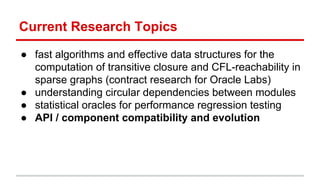




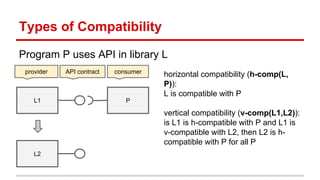
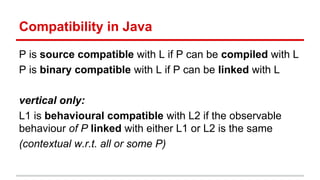
![Binary Compatibility (v-Version)
A change to a type is binary compatible with pre-existing
binaries if pre-existing binaries that previously linked
without error will continue to link without error.
[JLS 7, sect 13.1]](https://image.slidesharecdn.com/whatjavadevelopersdontknowaboutapicompatibility-140608180114-phpapp01/85/What-java-developers-don-t-know-about-api-compatibility-10-320.jpg)

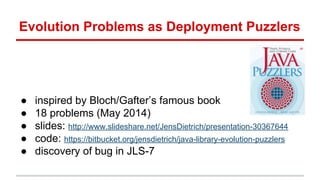


![Source Compatibility !=> Binary Compatibility
public class Foo {
public static java.util.Collection getColl() {
return new java.util.ArrayList();
}
}
public class Foo {
public static java.util.List getColl() {
return new java.util.ArrayList();
}
}
public class Main {
public static void main(String[] args) {
java.util.Collection coll = Foo.getColl();
System.out.println(coll);
}
}
libversion1.0libversion2.0
client program using lib
specialising return type
(strengthen postcondition!)](https://image.slidesharecdn.com/whatjavadevelopersdontknowaboutapicompatibility-140608180114-phpapp01/85/What-java-developers-don-t-know-about-api-compatibility-15-320.jpg)
![Binary Compatibility !=> Source Compatibility
public class Foo {
public static List<String> getList() {
List<String> list = new ArrayList<String>();
list.add(”42”);
return list; }}
public class Foo {
public static List<Integer> getList() {
List<Integer> list = new ArrayList<Integer>();
list.add(42);
return list; }}
public class Main {
public static void main(String[] args) {
List<String> list = Foo.getList();
System.out.println(list.size());
}
}
libversion1.0libversion2.0
client program using lib](https://image.slidesharecdn.com/whatjavadevelopersdontknowaboutapicompatibility-140608180114-phpapp01/85/What-java-developers-don-t-know-about-api-compatibility-16-320.jpg)
![Binary Compatibility !=> Behavioural Comp.
public class Foo {
public static List<String> getList() {
List<String> list = new ArrayList<String>();
list.add(”42”);
return list; }}
public class Foo {
public static List<Integer> getList() {
List<Integer> list = new ArrayList<Integer>();
list.add(42);
return list; }}
public class Main {
public static void main(String[] args) {
List<String> list = Foo.getList();
for (String s:list) {
System.out.println(s);
}
}
}
libversion1.0libversion2.0
client program using lib](https://image.slidesharecdn.com/whatjavadevelopersdontknowaboutapicompatibility-140608180114-phpapp01/85/What-java-developers-don-t-know-about-api-compatibility-17-320.jpg)
![How Bizarre ...
import java.io.Serializable;
class Foo<T extends Serializable & Comparable> {
public void foo(T t) {
t.compareTo(””); System.out.println(t);
}
}
import java.io.Serializable;
class Foo<T extends Comparable & Serializable> {
public void foo(T t) {
t.compareTo(””); System.out.println(t);
}
}
public class Main implements java.io.Serializable {
public static void main(String[] args) {
Main m = new Main();
new Foo().foo(m);
}
}
libversion1.0libversion2.0
client program using lib](https://image.slidesharecdn.com/whatjavadevelopersdontknowaboutapicompatibility-140608180114-phpapp01/85/What-java-developers-don-t-know-about-api-compatibility-18-320.jpg)
![Constant Inlining
public class Foo {
public static final int MAGIC = 42;
}
public class Foo {
public static final int MAGIC = 43;
}
public class Main {
public static void main(String[] args) {
System.out.println(Foo.MAGIC);
}
}
libversion1.0libversion2.0
client program using lib](https://image.slidesharecdn.com/whatjavadevelopersdontknowaboutapicompatibility-140608180114-phpapp01/85/What-java-developers-don-t-know-about-api-compatibility-19-320.jpg)
